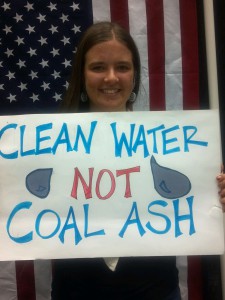Front Porch Blog
When state regulators were shown groundwater test samples taken near the Cape Fear River in eastern North Carolina with elevated levels of arsenic, thallium and chloride, the contaminants that seeped in from Lake Sutton, a coal ash pond next to the Sutton coal plant….that means the regulators made the plant clean it all up, right?

It's as simple as she says: do we want coal ash (which makes Robert de Niro in Cape Fear look like an alright guy), or do we want clean water?
Well, they didn’t. That’s why last week, the Southern Environmental Law Center filed a formal complaint on behalf of four groups in North Carolina to push for more enforcement from the state Environmental Management Commission on the regulation of coal ash ponds. Kemp Burdette, the Riverkeeper with Cape Fear River Watch, said that state regulators are collecting samples that exceed NC groundwater standards, but are not forcing any of the coal plants to clean it up. “Over time, exposure to this stuff is going to make people really sick,” he said. “It’s going to have an impact on the human body.”
Coal ash, the toxic byproduct of burning coal for electricity, is typically stored in wet, often unlined ponds. These ponds then seep into neighboring groundwater. All across the nation, groundwater resources have been contaminated by coal ash. And as the Washington Post recently demonstrated, any protection of our nation’s waters from coal ash is being halted until after the election.
In the months following the election, can we hope for a more serious discussion of coal ash? Currently, there are no federal protections from the EPA over this toxic substance. Though the agency has proposed two rules for the storage and disposal of coal ash, one of which would rightfully classify the slurry as hazardous waste, there has since been no actions on this proposal. Meanwhile, the dangerous status quo that allowed the coal ash disaster in Kingston, Tennessee, almost 4 years ago and is currently allowing our waterways to be compromised is still in place.
There are 37 coal ash ponds at 14 coal-fired power plants around the state of North Carolina. One of the coal ash ponds at Duke Energy’s Riverbend coal plant regularly contaminates Mountain Island Lake, which supplies the drinking water for almost 860,000 people in the Charlotte area. A recent study out of Duke University found high levels of arsenic in the part of the lake that receives water from the coal ash pond. Soil taken from the bottom also had high levels of arsenic.
Currently, there are no protections in place to force Duke and Progress Energy to clean up this pollution. That’s why grassroots organizations like We Love Mountain Island Lake are so important in the battle to clean up the coal ash ponds. Everyday, they fight the Riverbend coal ash ponds near Mountain Island Lake through education, advocacy and action. Through their efforts (like the movie below), they help others to fight for clean water and good health.
We Love Mountain Island Lake directs their own action!
But they aren’t the only ones taking notice of coal ash. Newspapers are voicing their opinions, and so are people of faith and everyday citizens.
You can stand up for your right to clean water. Start off today by writing a letter (like these) to the editor of your local newspaper, and telling everyone about the dangers of coal ash and dirty water. And as a helpful link, here is a guide from our friends at Greenpeace on how to write your letter
PREVIOUS
NEXT
Related News

Leave a comment
Your email address will not be published. Required fields are marked *
